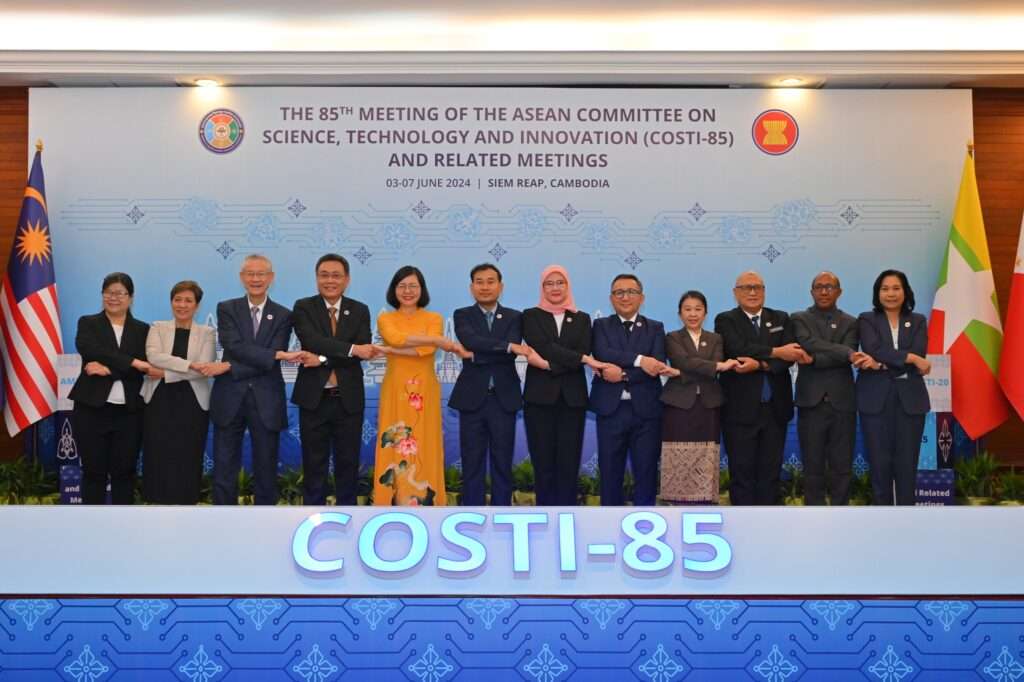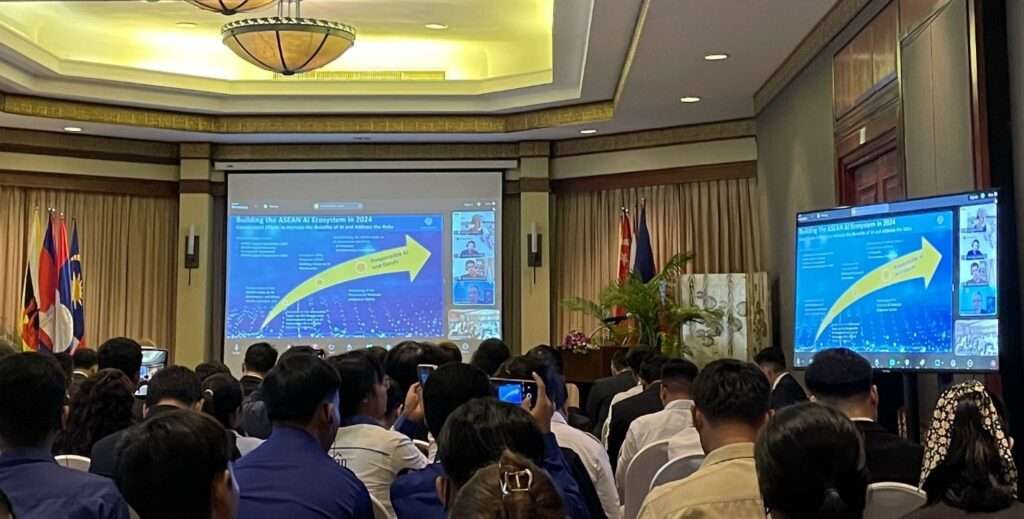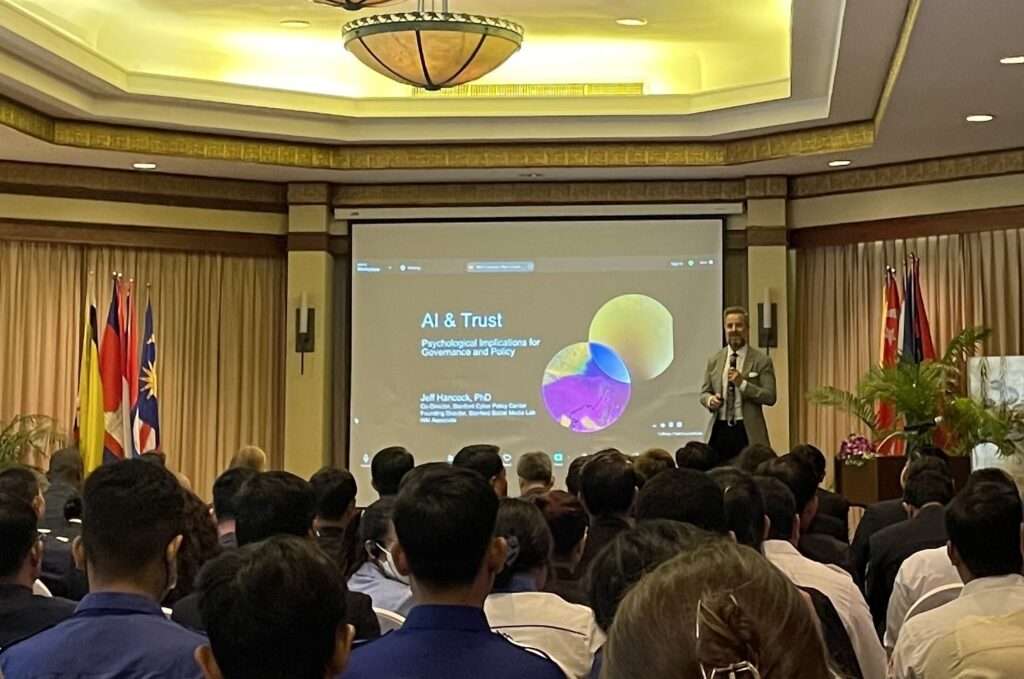បង្កើនអំណាចដលកម្ពុជាតាមរយៈបញ្ញាសិប្បនិម្មិត និងទិន្នន័យ៖ ការយល់ឃើញចេញពីសន្និសីទស្តីពីការប្រើប្រាស់បញ្ញាសិប្បនិម្មិតដោយផ្តោតលើមនុស្ស នៅក្នុងកិច្ចប្រជុំនៃគណៈកម្មាធិការអាស៊ានស្តីពីវិទ្យាសាស្ត្រលើកទី ៨៥ (COSTI-85)
នៅថ្ងៃច័ន្ទ ទី៣ ខែមិថុនា ឆ្នាំ ២០២៤ អង្គការទិន្នន័យអំពីការអភិវឌ្ឍ ហៅកាត់ថាអូឌីស៊ី បានចូលរួមសន្និសីទពេលរសៀលមួយ ក្រោមចំណងជើង “ការបង្កើតបរិយាកាសសមស្របសម្រាប់ការប្រើប្រាស់បញ្ញាសិប្បនិម្មិត (AI) ដោយផ្តោតលើមនុស្សនៅក្នុងអាស៊ាន” នៅសណ្ឋាគារ សូហ្វីតែល ក្នុងខេត្តសៀមរាប ប្រទេសកម្ពុជា។ សន្និសីទនេះគឺជាព្រឹត្តិការណ៍មួយនៃកិច្ចប្រជុំលើកទី ៨៥ នៃគណៈកម្មាធិការអាស៊ានស្តីពីវិទ្យាសាស្ត្រ បច្ចេកវិទ្យា និងនវានុវត្តន៍ (COSTI-85)។ សន្និសីទនេះត្រូវបានឧបត្ថម្ភដោយក្រសួងឧស្សាហកម្ម វិទ្យាសាស្ត្រ បច្ចេកវិទ្យា និងនវានុវត្តន៍កម្ពុជា (MISTI) សហការជាមួយអង្គការមូលនិធិអាស៊ី និង Stanford Human-Centered Artificial Intelligence (HAI) ។ ព្រឹត្តិការណ៍នេះផ្តោតលើប្រធានបទជាច្រើននៃបញ្ញាសិប្បនិម្មិត (AI) ដែលទាក់ទងនឹងអ្នកបង្កើតគោលនយោបាយ អ្នកពាក់ព័ន្ធក្នុងវិស័យឯកជន ស្ថាប័នអប់រំ និងអង្គការសង្គមស៊ីវិលក្នុងអាស៊ាន។ សន្និសីទនេះធ្វើឡើងតាមគន្លងនៃគោលនយោបាយរដ្ឋាភិបាលឌីជីថលកម្ពុជា ២០២២-២០៣៥ ដែលចេញផ្សាយដោយក្រសួងប្រៃសណីយ៍ និងទូរគមនាគមន៍ (MPTC) ក្នុងខែមករា ឆ្នាំ២០២២ និងផែនទីបង្ហាញផ្លូវបច្ចេកវិទ្យាឌីជីថលដែលបោះពុម្ពដោយ MISTI និងក្រុមប្រឹក្សាជាតិស្តីពីវិទ្យាសាស្ត្រ បច្ចេកវិទ្យា និងនវានុវត្តន៍ (NCSTI) ក្នុងខែកក្កដា ឆ្នាំ២០២៣។ ផែនទីបង្ហាញផ្លូវបច្ចេកវិទ្យាឌីជីថលបានកំណត់បញ្ញាសិប្បនិម្មិត (AI)និង ម៉ាស៊ីនសិក្សា (machine learning) ជាបច្ចេកវិទ្យាាគន្លឹះដែលមានពិន្ទុខ្ពស់បំផុតទាក់ទងនឹងសារៈសំខាន់ និងលទ្ធភាពនៅពេលវាយតម្លៃធៀបនឹងបច្ចេកវិទ្យាដែលកំពុងរីកចម្រើនផ្សេងទៀត។ ផែនទីបង្ហាញផ្លូវមានគោលបំណងស្វែងរកការប្រើប្រាស់ បញ្ញាសិប្បនិម្មិត (AI) ដើម្បីបង្កើត “ប្រព័ន្ធអេកូឡូស៊ីដ៏រស់រវើកសម្រាប់ធុរកិច្ចឌីជីថលនៅក្នុងប្រទេស” ។ លើសពីនេះ គោលនយោបាយរដ្ឋាភិបាលឌីជីថលកម្ពុជាឆ្នាំ ២០២២-២០៣៥ ស្វែងរកការពន្លឿនការទទួលបានទិន្នន័យដែលអាចប្រើជាទិន្នន័យបណ្តុះបណ្តាល បញ្ញាសិប្បនិម្មិត (AI) តាមរយៈអភិបាលកិច្ចឌីជីថល និងគំនិតផ្តួចផ្តើមទិន្នន័យបើកទូលាយ។ សន្និសីទនេះបានអនុវត្តស្របតាមកិច្ចព្រមព្រៀងក្របខណ្ឌសេដ្ឋកិច្ចឌីជីថល (DEFA) របស់អាស៊ានដោយការលើកកម្ពស់អភិបាលកិច្ច បញ្ញាសិប្បនិម្មិត (AI) ប្រកបដោយក្រមសីលធម៌ ជំរុញកិច្ចសហប្រតិបត្តិការក្នុងតំបន់ និងការពង្រឹងការធ្វើសមាហរណកម្មឌីជីថលដើម្បីជំរុញកំណើនសេដ្ឋកិច្ច និងការច្នៃប្រឌិតនៅទូទាំងរដ្ឋជាសមាជិក។
វាគ្មិនទីមួយមកពី Stanford HAI បានធ្វើបទបង្ហាញលើប្រធានបទនៃភាពយុត្តិធម៌នៅក្នុង បញ្ញាសិប្បនិម្មិតចម្លងតាម (generative AI)។ បទបង្ហាញនេះបានគូសបញ្ជាក់ពីបញ្ហាពេលបច្ចុប្បន្នមួយចំនួននៅក្នុង បញ្ញាសិប្បនិម្មិត (AI) រួមទាំងកង្វះសមធម៌សកល និងបរិយាបន្ន ភាពលំអៀងក្នុងការសម្រេចចិត្ត និងភាពមិនយុត្តិធម៌នៃក្បួនដោះស្រាយ។ ការស្រាវជ្រាវពីមុនបានបង្ហាញពីភាពលំអៀងយេនឌ័រនៅក្នុងគំរូភាសាធំៗដែលពេញនិយមនៅពេលប្រើក្នុងការសម្រេចចិត្ត។ វាគ្មិនបានសង្កត់ធ្ងន់លើតម្រូវការសម្រាប់ដំណោះស្រាយបច្ចេកទេស សង្គម ដែលទទួលស្គាល់ប្រធានបទធម្មជាតិនៃប្រព័ន្ធកុំព្យូទ័រ និងក្បួនដោះស្រាយដែលបង្កប់ដោយ ភាពលំអៀងរបស់មនុស្ស។ សារៈសំខាន់នៃការដាក់មូលដ្ឋានលើ បញ្ញាសិប្បនិម្មិត (AI) នៅក្នុងបរិបទក្នុងស្រុកត្រូវបានលើកជាឧទាហរណ៍់នៃការអភិវឌ្ឍន៍គំរូភាសាវៀតណាមដ៏ធំមួយដោយក្រុមរបស់គាត់ដែលអាចប្រើបានជាសាធារណៈលើអ៊ីនធឺណិតដោយឥតគិតថ្លៃ។
វាគ្មិនទីពីរនៃពេលរសៀលក៏មកពី Stanford HAI ផងដែរ។ ការស្រាវជ្រាវបានផ្តោតលើការរំពឹងទុករបស់មនុស្សចំពោះប្រព័ន្ធ បញ្ញាសិប្បនិម្មិត (AI)។ បទបង្ហាញបានផ្តោតលើភាពជឿជាក់នៃប្រព័ន្ធ បញ្ញាសិប្បនិម្មិត(AI)។ វាគ្មិនបានចង្អុលបង្ហាញពីភាពខុសគ្នាយ៉ាងច្បាស់រវាងផ្នត់គំនិត “អ្នកបើកយន្តហោះ” និង “អ្នកដំណើរ” ទាក់ទងនឹង បញ្ញាសិប្បនិម្មិត(AI) ជូនទៅសាធារណជនទូទៅ។ “អ្នកបើកយន្តហោះ” មានបំណងចង់ទទួលយកប្រព័ន្ធ បញ្ញាសិប្បនិម្មិត(AI) ហើយមានអារម្មណ៍ថាមានការគ្រប់គ្រងនៅពេលប្រើប្រាស់ប្រព័ន្ធ បញ្ញាសិប្បនិម្មិត(AI)។ “អ្នកដំណើរ” មានការប្រុងប្រយ័ត្នចំពោះប្រព័ន្ធ បញ្ញាសិប្បនិម្មិត(AI) ពីព្រោះពួកគេមានអារម្មណ៍ថាពួកគេ់ប្រគល់ការគ្រប់គ្រងច្រើនពេកចំពោះប្រព័ន្ធ។ ទិន្នន័យបង្ហាញថាក្រុមអ្នកគ្រប់គ្រងពាណិជ្ជកម្មទំនងជាជឿជាក់លើប្រព័ន្ធ បញ្ញាសិប្បនិម្មិត(AI) ជាងក្រុមបុគ្គលិកដែលអាចរារាំងការប្រើប្រាស់ប្រកបដោយប្រសិទ្ធភាព។ ជាចុងក្រោយ វាគ្មិនបានបញ្ជាក់សារជាថ្មីថា ភាពឯកជនគឺជាមូលដ្ឋានគ្រឹះក្នុងការកសាងប្រព័ន្ធ បញ្ញាសិប្បនិម្មិត(AI) ដែលអាចជឿទុកចិត្តបាន។
បន្ទាប់មក បទបង្ហាញអនឡាញបង្ហាញអំពីបទប្បញ្ញត្តិ បញ្ញាសិប្បនិម្មិត(AI) និងគំរូអភិបាលកិច្ចដែលពេញនិយមបំផុតមួយចំនួននៅជុំវិញពិភពលោក។ វាគ្មិនមកពីសាកលវិទ្យាល័យ Côte d’Azur បានសង្កត់ធ្ងន់លើសារៈសំខាន់នៃការប្រើប្រាស់បច្ចេកវិទ្យា ដើម្បីចាប់ផ្តើមកំណើនសេដ្ឋកិច្ចសម្រាប់ប្រទេសកំពុងអភិវឌ្ឍន៍។ លោកក៏បានលើកឡើងពីការជជែកដេញដោលដែលកំពុងកើតឡើងថា តើអត្ថប្រយោជន៍នៃបច្ចេកវិទ្យា បញ្ញាសិប្បនិម្មិត(AI)នឹងសាយភាយក្នុងចំណោមមូលដ្ឋានដ៏ធំទូលាយមួយ ឬថាតើវាគ្រាន់តែពង្រឹងអង្គភាពលេចធ្លោនាពេលបច្ចុប្បន្នជាមួយនឹងអំណាចទីផ្សារធំ។ តម្រូវការដើម្បីគ្រប់គ្រង បញ្ញាសិប្បនិម្មិត(AI)ជាប្រព័ន្ធជាជាងជាផ្នែកនៃបច្ចេកវិទ្យាត្រូវបានសង្កត់ធ្ងន់។ នេះនឹងមានសារៈសំខាន់ជាពិសេស ប្រសិនបើវឌ្ឍនភាពសំខាន់ៗណាមួយត្រូវបានធ្វើឡើងទាក់ទងនឹងការគ្រប់គ្រងសកលនៃ បញ្ញាសិប្បនិម្មិត(AI)។ ចំនុចនេះនឹងមានសារៈសំខាន់ជាពិសេស ប្រសិនបើវឌ្ឍនភាពសំខាន់ៗណាមួយត្រូវបានធ្វើឡើងទាក់ទងនឹងការគ្រប់គ្រងសកលនៃ បញ្ញាសិប្បនិម្មិត(AI) ។ វាគ្មិនបានស្នើឱ្យគ្រប់គ្រង បញ្ញាសិប្បនិម្មិត(AI) ក្នុងបួនវិមាត្រ៖ គោលនយោបាយប្រកួតប្រជែង គោលនយោបាយឧស្សាហកម្ម គោលនយោបាយ IP និងបច្ចេកវិទ្យាប្រើប្រាស់ពីររបៀប។
បន្ទាប់ពីការកត់សម្គាល់ទាំងនេះ សមាជិកក្រុមនីមួយៗបានផ្តល់ទិដ្ឋភាពទូទៅនៃបទប្បញ្ញត្តិ បញ្ញាសិប្បនិម្មិត(AI) និងអភិបាលកិច្ចនៅក្នុងសហភាពអឺរ៉ុប សហរដ្ឋអាមេរិក និងអាស៊ាន។ សហភាពអឺរ៉ុបបានអនុម័តច្បាប់ បញ្ញាសិប្បនិម្មិត(AI) របស់ខ្លួននៅក្នុងខែឧសភា ឆ្នាំ ២០២៤។ វាស្វែងរកការផ្តល់នូវនិយមន័យស្តង់ដារ បញ្ញាសិប្បនិម្មិត(AI) បើកប្រព័ន្ធ បញ្ញាសិប្បនិម្មិត(AI) ប្រកបដោយសុវត្ថិភាព និងគួរឱ្យទុកចិត្ត លើកកម្ពស់ការច្នៃប្រឌិត និងការពារសិទ្ធិជាមូលដ្ឋាន។ វាគ្មិនមកពី Center for Digital Trust (C4DT) បានពិភាក្សាអំពីវិធីសាស្ត្រផ្អែកលើហានិភ័យរបស់សហភាពអឺរ៉ុបចំពោះសុវត្ថិភាព បញ្ញាសិប្បនិម្មិត(AI) ដែលចាត់ថ្នាក់ប្រព័ន្ធ បញ្ញាសិប្បនិម្មិត(AI) ជាបួនប្រភេទហានិភ័យ៖ ហានិភ័យដែលមិនអាចទទួលយកបាន ហានិភ័យខ្ពស់ ហានិភ័យមានកំណត់ និងហានិភ័យតិចតួចបំផុត។ ក្រោយមក អ្នកស្រាវជ្រាវមកពី Stanford HAI បានរៀបរាប់លម្អិតអំពីបទបញ្ជាប្រតិបត្តិរបស់សហរដ្ឋអាមេរិកស្តីពី បញ្ញាសិប្បនិម្មិត(AI) ដែលផ្តល់ការណែនាំដល់ភ្នាក់ងារសហព័ន្ធ។ គាត់ក៏បានសង្ខេបវិក័យប័ត្រ បញ្ញាសិប្បនិម្មិត(AI)មួយចំនួននៅក្នុងសភាដែលត្រូវបានស្នើឡើង។ ជាចុងក្រោយ តំណាងមកពីវិទ្យាស្ថាន បញ្ញាសិប្បនិម្មិត(AI) អាស៊ីប៉ាស៊ីហ្វិក(AIAPI) សំណើរលម្អិតអំពីមគ្គុទ្ទេសក៍របស់រដ្ឋមន្ត្រីឌីជីថលអាស៊ាន ស្តីពីអភិបាលកិច្ច និងក្រមសីលធម៌ បញ្ញាសិប្បនិម្មិត(AI)ដែលត្រូវបានអនុម័តក្នុងខែកុម្ភៈ ឆ្នាំ ២០២៤។ កិច្ចខិតខំប្រឹងប្រែង បញ្ញាសិប្បនិម្មិត(AI)របស់សិង្ហបុរីត្រូវបានកោតសរសើរ និងគូសបញ្ជាក់ជាពិសេស។ វាគ្មិនបានកត់សម្គាល់កិច្ចខិតខំប្រឹងប្រែងរបស់ប្រទេសសិង្ហបុរីក្នុងការបង្កើតស្តង់ដារបច្ចេកទេសដែលអាចធ្វើអន្តរកម្មជាមួយនឹង NIST របស់សហរដ្ឋអាមេរិក។
តំណាងប្រចាំប្រទេសរបស់អង្គការមូលនិធិអាស៊ីនៅកម្ពុជាបានថ្លែងបន្ទាប់ពីបញ្ចប់បទបង្ហាញអនឡាញ។ លោកស្រីបានលើកឡើងពីតម្រូវការសម្រាប់ការទទួលយក បញ្ញាសិប្បនិម្មិត(AI)ដែលផ្តោតលើមនុស្សដោយយុត្តិធម៌ និងផ្តោតលើមនុស្ស ដែលអាចឱ្យបច្ចេកវិទ្យារីកចម្រើន និងបម្រើសង្គមកាន់តែទូលំទូលាយ។ គាត់បានលើកទឹកចិត្តឱ្យមានការសហការ និងការសន្ទនាលើ បញ្ញាសិប្បនិម្មិត(AI)ដើម្បីបង្កើតសមត្ថភាពបង្រៀន។
សេចក្តីថ្លែងការណ៍បញ្ចប់ត្រូវបានឯកឧត្តម ហែម វ៉ាន់ឌី រដ្ឋមន្ត្រីក្រសួងឧស្សាហកម្ម វិទ្យាសាស្ត្រ បច្ចេកវិទ្យា និងនវានុវត្តន៍បានលើកឡើងអំពីសារៈសំខាន់នៃការបន្តកិច្ចសន្ទនារវាងភាគីពាក់ព័ន្ធ។
តួនាទីរបស់បញ្ញាសិប្បនិម្មិត(AI) នៅក្នុងសហគ្រាសធុនតូច និងមធ្យមរបស់កម្ពុជា
សន្និសីទបានសង្កត់ធ្ងន់លើកិច្ចខិតខំប្រឹងប្រែងរួមគ្នាដែលទាមទាររវាងវិស័យសាធារណៈ វិស័យឯកជន វិស័យអប់រំ និងអង្គការសង្គមស៊ីវិល ដើម្បីប្រើប្រាស់ បញ្ញាសិប្បនិម្មិត(AI)ប្រកបដោយជោគជ័យ ដើម្បីពន្លឿនការអភិវឌ្ឍន៍សហគ្រាសធុនតូច និងមធ្យម (SMEs) នៅកម្ពុជា។ សហគ្រាសធុនតូច និងមធ្យម មានសារៈសំខាន់ជាពិសេសនៅក្នុងប្រទេសកម្ពុជា ដោយសារសហគ្រាសធុនតូច និងមធ្យម “តំណាងឱ្យ ៧០% នៃការងារសរុប និង ៩៩.៨% នៃក្រុមហ៊ុន និងចូលរួមចំណែក ៥៨% ដល់ផលិតផលក្នុងស្រុកសរុប (GDP)” យោងទៅតាម KhmerSME ។ ប្រធានបទដែលជាប់លាប់នៅក្នុងសន្និសីទគឺតម្រូវការសម្រាប់លទ្ធភាពទទួលបានទិន្នន័យទូលំទូលាយ គោលនយោបាយ បញ្ញាសិប្បនិម្មិត(AI)សមរម្យ និងបទប្បញ្ញត្តិ បញ្ញាសិប្បនិម្មិត(AI)ជាមូលដ្ឋានដែលអាចគាំទ្រដល់កំណើននៃសហគ្រាសធុនតូច និងមធ្យម។ គំនិតផ្តួចផ្តើមទិន្នន័យបើកទូលាយអាចជួយកែលម្អលទ្ធភាពទទួលបានទិន្នន័យ ដែលមានសារៈសំខាន់សម្រាប់ប្រព័ន្ធ បញ្ញាសិប្បនិម្មិត(AI)។ សហគ្រាសធុនតូច និងមធ្យមអាចប្រើប្រាស់ បញ្ញាសិប្បនិម្មិត(AI)ដើម្បីកែលម្អបទពិសោធន៍របស់អតិថិជន បង្កើនប្រសិទ្ធភាពខ្សែសង្វាក់ផ្គត់ផ្គង់ ធ្វើការសម្រេចចិត្តដែលផ្អែកលើទិន្នន័យ និងឈានដល់ទីផ្សារថ្មី។
ផែនទីបង្ហាញផ្លូវបច្ចេកវិទ្យាឌីជីថល ដែលសង្កត់ធ្ងន់លើសារៈសំខាន់នៃ បញ្ញាសិប្បនិម្មិត(AI)និងម៉ាស៊ីនសិក្សា គឺជាមូលដ្ឋានដ៏រឹងមាំមួយដើម្បីបន្តឌីជីថលនីយកម្ម និងកំណើនសេដ្ឋកិច្ចរបស់កម្ពុជា។ ផែនទីបង្ហាញផ្លូវមានគោលបំណងលើកកម្ពស់ផលិតភាព ប្រសិទ្ធភាព និងការច្នៃប្រឌិតសម្រាប់ការអភិវឌ្ឍន៍សេដ្ឋកិច្ចសង្គម ដោយប្រើប្រាស់អក្ខរកម្មឌីជីថល ជំនាញ IT និងការកសាងហេដ្ឋារចនាសម្ព័ន្ធឌីជីថលដ៏រឹងមាំ។ សហគ្រាសធុនតូច និងមធ្យមនៅកម្ពុជានឹងទទួលបានអត្ថប្រយោជន៍ពី “បរិយាកាសច្បាប់ និងបទប្បញ្ញត្តិដែលគាំទ្រដល់ការរីកចម្រើននៃវិស័យឌីជីថល និងលើកកម្ពស់ការច្នៃប្រឌិត និងភាពជាសហគ្រិន ទន្ទឹមនឹងការការពារសិទ្ធិអ្នកប្រើប្រាស់ និងអាជីវកម្មដែលប្រតិបត្តិការលើអ៊ីនធឺណិត”។
គោលនយោបាយរដ្ឋាភិបាលឌីជីថលកម្ពុជា ២០២២-២០៣៥ គូសបញ្ជាក់បន្ថែមអំពីតួនាទីដែល បញ្ញាសិប្បនិម្មិត(AI)អាចដើរតួក្នុងការកែលម្អសេវាសាធារណៈតាមរយៈអភិបាលកិច្ចឌីជីថល។ អាស៊ីអាគ្នេយ៍ទទួលបានពិន្ទុ ៤០.៥ នៅក្នុងសន្ទស្សន៍ បញ្ញាសិប្បនិម្មិត(AI)ប្រចាំតំបន់អាស៊ីប៉ាស៊ីហ្វិករបស់ Salesforce ដែលដាក់តំបន់នេះនៅពីក្រោយប្រទេសអភិវឌ្ឍន៍អាស៊ីបូព៌ាជាច្រើនដូចជា ចិន ជប៉ុន និងកូរ៉េខាងត្បូង។ ប្រព័ន្ធ បញ្ញាសិប្បនិម្មិត(AI)អាចទទួលបានអត្ថប្រយោជន៍ពីកម្រិតទីពីរនៃគោលនយោបាយរដ្ឋាភិបាលឌីជីថលកម្ពុជាឆ្នាំ ២០២២-២០៣៥ ដែលស្វែងរកការធានាថា “ព័ត៌មានរបស់រដ្ឋាភិបាលបើកទូលាយជាសាធារណៈដើម្បីធានានូវតម្លាភាព និងគណនេយ្យភាព”។ គោលការណ៍ទិន្នន័យបើកទូលាយបែបនេះអាចផ្តល់នូវទិន្នន័យបណ្តុះបណ្តាលគុណភាពខ្ពស់សម្រាប់ប្រព័ន្ធ បញ្ញាសិប្បនិម្មិត(AI) និងអនុញ្ញាតឱ្យសហគ្រាសធុនតូច និងមធ្យមប្រើប្រាស់ប្រព័ន្ធ បញ្ញាសិប្បនិម្មិត(AI)ជាមួយនឹងសំណុំទិន្នន័យសហសម័យ។ ការលើកកម្ពស់តម្លាភាព សមភាព និងគណនេយ្យភាព តាមរយៈគំនិតផ្តួចផ្តើមទិន្នន័យបើកទូលាយនៅក្នុង “យុទ្ធសាស្ត្រទី៥៖ ការរៀបចំអភិបាលកិច្ចនៃរដ្ឋាភិបាលឌីជីថល” នៃគោលនយោបាយរដ្ឋាភិបាលឌីជីថលកម្ពុជា ២០២២-២០៣៥ នឹងបណ្តុះការស្រាវជ្រាវ និងការច្នៃប្រឌិត បញ្ញាសិប្បនិម្មិត(AI)របស់កម្ពុជា។
អ្នកធ្វើបទបង្ហាញជាច្រើននាក់នៅក្នុងសន្និសីទបានរំលឹកឡើងវិញពីតម្រូវការសម្រាប់បរិស្ថានច្បាប់ និយតកម្ម និងទិន្នន័យដែលគាំទ្រ់សហគ្រាសធុនតូច និងមធ្យម ដើម្បីទទួលយកបច្ចេកវិទ្យា បញ្ញាសិប្បនិម្មិត(AI)និងបច្ចេកវិទ្យាទំនើបផ្សេងទៀត។កិច្ចព្រមព្រៀងក្របខណ្ឌសេដ្ឋកិច្ចឌីជីថលអាស៊ាន (DEFA) មានគោលបំណងបង្កើតបរិយាកាសបទប្បញ្ញត្តិស្ដង់ដារ ដែលសម្របសម្រួលលំហូរទិន្នន័យឆ្លងព្រំដែនប្រកបដោយភាពរលូន និងហេដ្ឋារចនាសម្ព័ន្ធឌីជីថលដ៏រឹងមាំ ដែលមានសារៈសំខាន់សម្រាប់ការអភិវឌ្ឍន៍ និងអភិបាលកិច្ចនៃបញ្ញាសិប្បនិម្មិត(AI) នៅក្នុងតំបន់។ បទប្បញ្ញត្តិរបស់ DEFA លើអភិបាលកិច្ច បញ្ញាសិប្បនិម្មិត(AI)ផ្តោតលើការអនុវត្តស្តង់ដារសីលធម៌ ការចុះសម្រុងគ្នានឹងបទប្បញ្ញត្តិ បញ្ញាសិប្បនិម្មិត(AI)និងជំរុញការបង្កើតថ្មីតាមរយៈកិច្ចសហប្រតិបត្តិការក្នុងចំណោមរដ្ឋជាសមាជិក។ ការអនុវត្តដែលស្របនឹងកិច្ចព្រមព្រៀងនេះះត្រូវបានគេរំពឹងថានឹងពង្រឹងការផ្ទេរចំណេះដឹង និងលើកកម្ពស់ការត្រៀមខ្លួន បញ្ញាសិប្បនិម្មិត(AI)នៅទូទាំងបណ្តាប្រទេសអាស៊ាន ដោយដោះស្រាយភាពខុសគ្នានាពេលបច្ចុប្បន្ននៅក្នុងការអនុម័ត បញ្ញាសិប្បនិម្មិត(AI) និងក្របខណ្ឌបទប្បញ្ញត្តិ។
តាមរយៈការលើកកម្ពស់អន្តរប្រតិបត្តិការ និងការធ្វើសមាហរណកម្ម DEFA គាំទ្រដល់ការបង្កើតសេដ្ឋកិច្ចឌីជីថលដ៏ស្អិតរមួត ដែលអនុញ្ញាតឱ្យក្រុមហ៊ុន បញ្ញាសិប្បនិម្មិត(AI) រុករកការអនុលោមតាមច្បាប់កាន់តែងាយស្រួល និងជំរុញបរិយាកាសធុរកិច្ចអំណោយផលសម្រាប់ការច្នៃប្រឌិត និងការរីកចម្រើនដែលជំរុញដោយ បញ្ញាសិប្បនិម្មិត(AI) DEFA នឹងជំរុញកំណើន និងការច្នៃប្រឌិតនៅក្នុងឧស្សាហកម្មនេះ ខណៈពេលដែលធានាថា អត្ថប្រយោជន៍នៃការផ្លាស់ប្តូរឌីជីថលត្រូវបានចែករំលែកក្នុងចំណោមភាគីពាក់ព័ន្ធទាំងអស់។ គោលនយោបាយទិន្នន័យបើកទូលាយ និងក្របខណ្ឌច្បាប់ដ៏រឹងមាំនឹងគាំទ្រដល់ការផ្លាស់ប្តូរឌីជីថលរបស់ប្រទេសកម្ពុជា និងជួយឱ្យដំណើរការឆ្ពោះទៅរកប្រធានបទសំខាន់នៃសន្និសីទនៃការប្រើប្រាស់បញ្ញាសិប្បនិម្មិត(AI) ដែលផ្តោតលើមនុស្ស។




